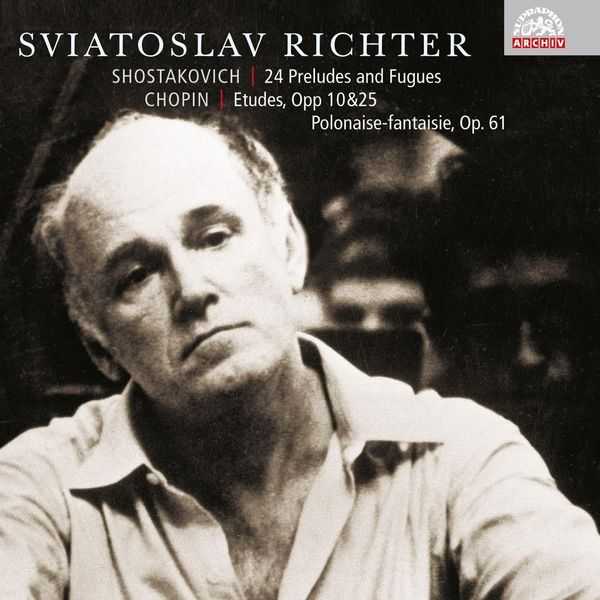
Composer: Frédéric François Chopin, Dmitri Shostakovich
Performer: Sviatoslav Richter
Format: FLAC (tracks)
Label: Supraphon
Catalogue: SU37962
Release: 2008
Size: 323 MB
Recovery: +3%
Scan: cover
Shostakovitch: 24 Preludes and Fugues, Op. 87
01. No. 3 in G Major, Moderato non troppo – Allegro molto
02. No. 6 in B Minor, Allegretto – Moderato
03. No. 7 in A Major, Allegro poco moderato – Allegretto
04. No. 2 in A Minor, Allegro – Allegretto
05. No. 18 in F Minor, Moderato – Moderato con moto
06. No. 4 in E Minor, Andante – Adagio
Chopin: Etudes, Op. 10:
07. No. 1 in C Major, Allegro
08. No. 2 in A Minor, Allegro
09. No. 3 in E Major, Lento ma non troppo
10. No. 4 in C-Sharp Minor, Presto
11. No. 10 in A-Flat Major, Assai vivace
12. No. 11 in E-Flat Major, Allegretto
13. No. 12 in C Minor, Allegro con fuoco
Chopin: Etudes, Op. 25
14. No. 5 in E Minor, Etude
15. No. 6 in G-Sharp Minor, Etude
16. No. 7 in C-Sharp Minor, Etude
17. No. 8 in D-Flat Major, Etude
18. No. 11 in A Minor, Etude
19. No. 12 in C Minor, Etude
20. Chopin: Polonaise-fantaisie in A-Flat Major, Op. 61
Two factors should disqualify this disc immediately. First, the pieces are incomplete and out of order. Second, and arguably more crucially, the pianist misses handfuls of notes in nearly every selection and bucketfuls of notes in some. But some listeners won’t care about these things because of the miracle of Sviatoslav Richter. What in another pianist would be grounds for dismissal is here cause for celebration. Check out Richter’s Shostakovich: the mysterious colors of his F minor Prelude and Fugue, the fleet virtuosity of his A minor Prelude and Fugue, or the intensity of his E minor Prelude and Fugue. Similarly, the hurtling tempos of Chopin’s C major Étude, Op. 10; the shattering climax of his E major Étude, Op. 10; the haunted tragedy of his A minor Étude, Op. 25; or the reckless heroism of his C minor etudes from both Opus 10 and Opus 25. Richter is clearly a pianist with a staggering technique: any pianist who can race through the E minor Étude, Op. 25, at this breakneck pace is manifestly a virtuoso. And clearly he’d rather obey the spirit than the letter of the score. Even though the buildup to the climax of the E major Étude, Op. 10, is splashed with splayed sonorities, the climax itself is so overwhelmingly cathartic that it’s hard to recall what led up to it. But above all, there’s his sublime interpretation of the Polonaise-Fantaisie in A flat major, Op. 61, particularly its evanescent coda, which seems to float into the ether under Richter’s tender touch. Recorded in Prague in 1956 (Shostakovich and Chopin’s Polonaise-Fantaisie) and in 1960 (Chopin’s etudes), the Czech label’s monaural sound is plain and direct, but honest.



